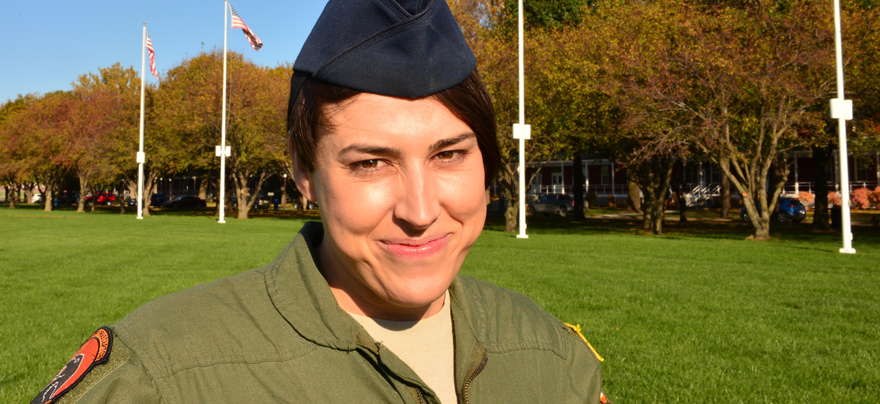US Air Force Highlights Transgender Airman’s Sexual Journey
 In a near-novel length official article, the US Air Force highlighted the sexual journey of SSgt Ashleigh Buch as “he” became “she” under military policy — including the proclamation that Buch is the “only openly transgender Airman in the Air Force” currently allowed to be on flight status. Previously, Buch’s medical status would have been disqualifying.
In a near-novel length official article, the US Air Force highlighted the sexual journey of SSgt Ashleigh Buch as “he” became “she” under military policy — including the proclamation that Buch is the “only openly transgender Airman in the Air Force” currently allowed to be on flight status. Previously, Buch’s medical status would have been disqualifying.
Not too much unlike the previously discussed Air Force article discussing the sexuality of a retired USAF Major, this article similarly acts as a platform to promote the validity, truth, and virtue of transexuality. In the article, Public Affairs representative SrA Rachel Hammes says of Buch:
She was, to the casual observer, still a man.
But she wasn’t, and had never been…
Beyond stating Buch’s personal feelings as facts for the rest of the Air Force to accept, the article raises another interesting — and potentially more significant — issue, as it discusses how his chain of command reacted, particularly as he was “outed” before transgenders were legally allowed to be in the military.
From LtCol David Rice, Buch’s squadron commander:
“We felt a moral responsibility to give her an avenue to protect her track record of excellence. We sat down with her every single week — the chief, the shirt, the flight commander, the flight chief and myself — and we would say, ‘What can we do to help? Here’s what we know today, here’s how the policy is evolving.’
As we worked through those eight months, we sat down virtually every week and said, ‘How are you feeling? How are you doing? Here’s what we’ve done since last week.’”
For those who feel allowing transgenders to serve in the military will be a non-event, Buch’s story is a cautionary tale, as the Air Force readily admits five members of a troop’s chain of command met with him every week for 8 months — a substantial amount of special attention impossible to give every other Airman in the unit, and a degree normally reserved only for “problem children” — because it distracts the leadership from its mission.
It is notable, too, that even before transgenders were allowed to serve, Buch’s chain of command went out of their way to try to get him authorization to present as a woman on duty — further indications the Air Force had already decided the policy was to change, even before the decision was made:
[The] 338th CTS worked to write exception to policy letters to allow Buch to conform to female Air Force standards of dress, appearance, PT standards and facility usage…
Those would be single-gender facilities, meaning the unit was attempting to integrate “him” into female latrines and showers, exposing female Airmen to an environment then-military policy said they shouldn’t have to see.
Buch’s chain of command remains not just accepting, but notably supportive:
Col. Marty Reynolds, commander of the 55th Wing, said he’s proud to see the Air Force opening a new frontier of inclusivity and acceptance.
“The military is a reflection of the country we defend,” he said. “We share a wide variety of backgrounds, values and beliefs – and together we make up the greatest Air Force in the world. In order to succeed, we need a diverse force focused on executing our mission. Ashleigh is an Airman who is doing just that and making Offutt great. I’m proud to have her on our team!”
What if Col “Moose” Reynolds’ moral or religious beliefs compelled him such that he could not express “pride” for acceptance of neosexuality? Sure, a Christian officer could put out a generic statement saying something about diversity in the Air Force, but Reynolds went beyond that — as, it seems, did every other member of Buch’s chain of command.
Where does that leave Buch’s fellow Airmen who have moral or religious objections to the LGBT movement — knowing now their entire chain of command has publicized its favor toward ~3% over ~70%?
Might a Christian (or Muslim, or Jewish) officer looking forward to commanding a unit have to consider whether he might lose his command — or even the opportunity to command — if he couldn’t state his affirmative “pride” in homosexuals and transgenders?
In point of fact, when DADT was first repealed, a few officers who were already commanders at the time — and Christians — breathed a sigh of relief when they completed their tour without having such a conflict arise. After their command, they were anxious — if disappointed — to, in their words, retire before the “social engineering” pendulum swung even further.
They were concerned about how Christians would be treated in the military as sexuality began to trump religion.
Following a few years of real-world, verifiable examples of military Christians being sanctioned for their views on homosexuality, it would seem they now know the answer.
ADVERTISEMENT